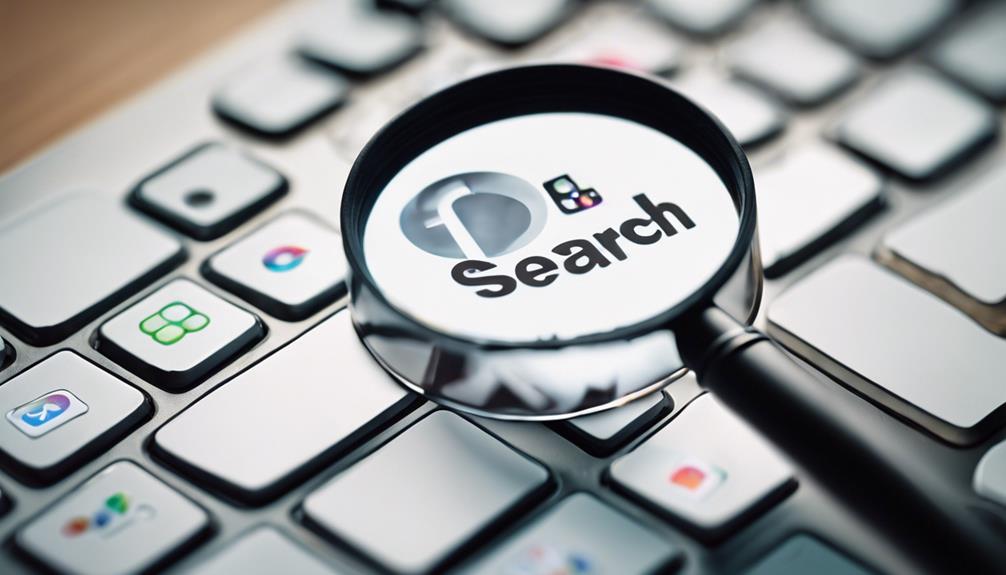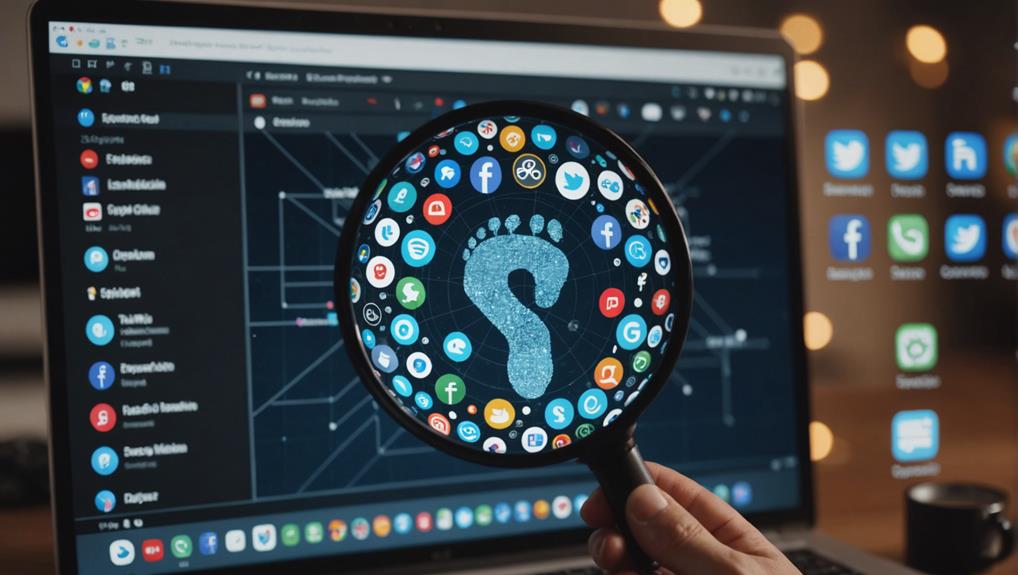
You can't directly find out if someone is specifically searching for you online, but you can set up tools to alert you when your name pops up on the internet. Google Alerts is a handy way to get notified via email whenever new mentions of your name appear online. Additionally, checking who views your LinkedIn profile and monitoring your mentions on social media platforms can give you clues about who's interested in you. By keeping an eye on these tools, you'll have a better grasp on your digital presence. There's more to explore on how these tools can enhance your understanding of your online visibility.
Understanding Your Digital Footprint

Your digital footprint is the trail of data you leave behind while using the internet. It includes every click, search, post, and like, all of which paint a picture of your online behavior. When you engage on social media, make purchases, or register for websites, you're adding to this digital trail. It's essential you're aware of this as it affects what others can discover about you online.
Consider how often you search for others online; it's just as easy for someone to look you up. The information available about you could range from basic contact details to deeper insights based on your social media activity. This data can influence how you're perceived both personally and professionally.
To manage your digital footprint effectively, start by reviewing your privacy settings on social networks and other online platforms. Are they set to public or private? Do you know what information you're sharing? Regularly checking these can help you maintain control over what's visible to others.
Setting Up Google Alerts
To stay informed about what's being said about you online, consider setting up Google Alerts. This tool sends you emails when new results—like web pages, newspaper articles, or blogs—that match your search terms appear on Google. It's free and easy to use.
First, you'll need a Google account. Once you're logged in, head to the Google Alerts page. In the 'Create an alert about' box, type your name or any other term you want to monitor. You can enter multiple terms to track different variations or spellings of your name.
Next, click on 'Show options.' Here, you can refine your alert by frequency, sources, language, and region. You might choose to receive alerts as they happen, once a day, or once a week. It depends on how closely you want to monitor the mentions.
After adjusting the settings, click 'Create Alert.' Now, you'll start receiving emails whenever Google finds new mentions of your specified terms. It's a practical way to keep tabs on what's being said about you without constantly searching for yourself.
Monitoring Social Media Mentions
In addition to Google Alerts, keeping an eye on social media platforms can offer real-time insights into what others are saying about you. Platforms like Twitter, Facebook, and Instagram have built-in search functions that allow you to track mentions of your name or brand. You'll want to regularly search for your name and any relevant hashtags to see what's popping up.
You can also use tools like Hootsuite or Mention to streamline this process. These services consolidate mentions from multiple social media platforms into a single dashboard, making it easier for you to see who's talking about you and what they're saying. This way, you're not jumping from one app to another; everything's in one place.
Monitoring your social media mentions isn't just about vanity; it's a practical way to gauge public perception and respond to feedback. If you notice positive mentions, you might want to engage with those users to strengthen relationships. Conversely, if there are negative comments, you have the opportunity to address them promptly and potentially turn a critic into a fan.
Checking LinkedIn Profile Views
Checking who's viewed your LinkedIn profile offers another layer of insight into your personal brand's reach online. You can see who's been peeking at your profile, which can be incredibly useful whether you're job hunting, networking, or just keeping tabs on your industry presence.
To start, simply log into your LinkedIn account. On your profile page, you'll find a section labeled 'Who viewed your profile.' This feature shows you a list of people who've recently checked out your profile. Depending on your privacy settings, you might see full names and titles, or you might just get anonymous views.
If you're curious about why certain people are looking at your profile, think about any recent interactions or shared posts that might've drawn attention. This can help you understand what's resonating with your network or broader audience.
Remember, you can adjust your own visibility in others' profile view notifications. If you prefer to browse anonymously, you can set this in your privacy settings. However, turning this feature on means you also won't be able to see who's viewed your profile unless you have a Premium account.
Engaging with those who view your profile could open new professional opportunities, so consider reaching out with a personalized message to start a conversation.
Using Web Analytics Tools

After exploring LinkedIn's profile views, let's focus on how web analytics tools can enhance your understanding of your online presence. Web analytics tools like Google Analytics or Clicky offer a deep dive into who's visiting your personal blog or website. You can see not just how many people visit, but where they come from, what keywords they used, and how long they stay.
These tools require a bit of setup. You'll need to install a tracking code on your website, which isn't too hard. Once you've got it running, you can start exploring the data. Look for spikes in traffic or unusual sources—it might indicate someone's taken a keen interest in you.
Don't just stop at the surface. Delve into the behavior flow to see what content captures attention the most. This can tell you what aspects of your profile or work are drawing people in. Are visitors bouncing quickly from your homepage, or are they checking out your portfolio or reading your blog posts? This insight helps you understand what's working and what's not.
Observing Email Tracking Alerts
As you explore further, consider setting up email tracking alerts to monitor who opens your emails and when. This tool isn't just for marketers; it's a practical way to see if someone's particularly interested in you or the information you're sharing.
You'll know each time someone opens an email, and you can even see how many times they've viewed it. This could give you a clue about who might be searching for you online.
You can choose from various email tracking software available that integrates seamlessly with your email provider. Once set up, they work in the background, sending you real-time notifications.
These alerts can tell you not just when your email is opened, but also where it was accessed from, and on what device. This geographical and device data can be incredibly revealing.
Reviewing Search Engine Tools

Now let's explore how search engine tools can help you identify who might be looking for information about you online. These tools don't directly alert you when someone types your name into a search box, but they do offer indirect ways to gauge your online visibility and track interest in your profile.
For instance, Google Alerts is a handy tool where you can set up notifications for your name or associated terms. Whenever there's a new mention of these terms on the web, you'll get an email alert. This can give you a clue if there's increased activity or interest around your name, possibly indicating searches.
Another approach involves using search engine optimization (SEO) tools like SEMrush or Ahrefs. While typically used to analyze website traffic, you can use these tools to check which keywords lead to your profiles or websites. If you notice spikes or trends in certain queries, this might suggest that more people are looking up information related to you.
Keep in mind, while these tools provide insights, they can't pinpoint who exactly is searching for you. They can, however, help you understand how often and in what context your name appears online, serving as a proxy to measure interest.
Managing Privacy Settings
You can enhance your online privacy by carefully adjusting your social media and web account settings. Start with your social media platforms like Facebook, Instagram, and Twitter. Dive into the privacy sections, typically found under 'Settings' or 'Privacy and Security'. Here, you can control who sees your posts, who can contact you, and who can look you up using your email or phone number.
For greater control, turn off the setting that allows search engines to link to your profile. This step makes it harder for someone to find your information through a simple Google search. Also, consider reviewing the list of applications and websites that have access to your social media data. Revoke access to those you no longer use or trust.
Next, think about your Google account. Google offers a dashboard for privacy checks, allowing you to review and adjust what information you're sharing and with whom. Make sure you're comfortable with the level of data sharing, especially in sections like Web & App Activity, Location History, and Ad Personalization.
Frequently Asked Questions
Is It Legal to Track Who Searches for My Name Online?
You can't legally track who searches for your name online due to privacy laws. Focus instead on managing your online presence to control what others see when they do search for you.
Can Deleting Social Media Profiles Stop People From Searching for Me?
Deleting your social media profiles might reduce visibility, but it won't stop determined people from searching for you online. They can still find information through other sources or cached data.
How Can I Find Out if Someone Is Using My Photos Online?
You can use reverse image search tools like Google Images or TinEye to check if someone's using your photos online. Just upload your picture and see if it appears elsewhere on the web.
What Should I Do if I Find My Information on a Search Alert?
If you find your information on a search alert, you should first verify the alert's accuracy. Then, contact the website's admin to request removal if it's unauthorized. Protect your privacy proactively!
Are There Any Apps Specifically Designed to Alert Me of Searches?
Yes, there are apps like Mention and Google Alerts designed specifically to notify you when your name or other specified terms appear in new online content, acting as a personal search detection tool.
Conclusion
You've got the tools now to see if someone's looking for you online. Set up Google Alerts, keep an eye on social media, and check who's viewing your LinkedIn profile.
Use web analytics for deeper insights and pay attention to email tracking alerts. Don't forget to review search engine tools occasionally.
Most importantly, manage your privacy settings to stay in control of what others can find about you. Stay informed and proactive about your digital presence!






